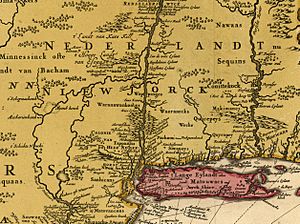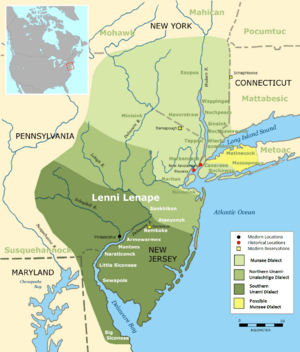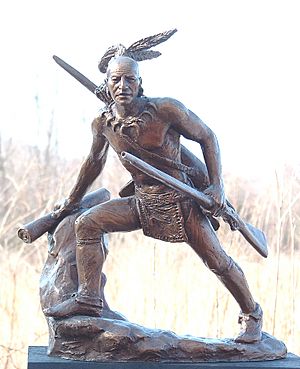Wappinger facts for kids

Wappinger land (in the middle, "Wappinges"), from a 1685 map
|
|
| Total population | |
|---|---|
| Extinct as a tribe | |
| Regions with significant populations | |
| Languages | |
| Eastern Algonquian languages, probably Munsee | |
| Religion | |
| traditional tribal religion | |
| Related ethnic groups | |
| Other Algonquian peoples |
The Wappinger were a group of Native American people. They spoke a language called Munsee, which is part of the Eastern Algonquian family. They lived in what is now southern New York and western Connecticut.
When Europeans first arrived in the 1600s, the Wappinger mainly lived in Dutchess County, New York. Their land stretched along the east side of the Hudson River. This included areas that are now Putnam and Westchester counties. Their territory went south to the Bronx and northern Manhattan Island. To the east, their land reached the Connecticut River Valley. To the north, it ended at the Roeliff Jansen Kill in southern Columbia County, New York.
The Wappinger were like the Lenape people. They were made up of many smaller groups, called bands. These bands were loosely connected and each had its own area. Their symbol, or totem, was the "enchanted wolf" with its paw raised.
Contents
The Name Wappinger
The exact meaning of the name Wappinger is not fully known. The way we spell it today, "Wappinger," was first used in 1643. But early European settlers used many different spellings. This was because they wrote down the name based on how it sounded in their own languages.
Some of the old spellings include: Wappink, Wappings, Wappingoes, Wawpings, and Wapinger.
One idea is that the name comes from a Munsee word, wápinkw, which means "opossum". Another idea is that it comes from a Dutch word, wapendragers, meaning "weapon-bearers." This might have been used because the Dutch and Wappinger had many conflicts.
Language and Connections
The Wappinger people were very closely related to the Munsee people. The Munsee were a large part of the Lenape people. All three groups spoke languages from the Eastern Algonquian family. The Wappinger spoke a dialect of the Munsee language.
Their close allies were the Mohican people to the north. To the southeast, on Long Island, were the Montaukett. Other New England tribes were to their east. The Wappinger were organized into about 18 bands. Each band had its own territory.
Wappinger History
The Wappinger people were very skilled at finding food. They moved with the seasons to hunt animals, fish in rivers, and collect shellfish. They also gathered fruits, seeds, roots, and honey. They grew crops like corn, beans, and squash.
By 1609, when Europeans first arrived, the Wappinger had camps along major rivers. Larger villages were often found where rivers met. They would stay in one village for about 20 years. Then they would move to a new spot a few miles away.
First European Contact
The first time Europeans met the Wappinger was in 1609. This happened when Henry Hudson explored the area on his ship, the Half Moon. At that time, it's thought that between 3,000 and 13,200 Wappinger people lived there.
An officer on Hudson's ship, Robert Juet, wrote about the Native Americans he met. He said they were friendly and brought tobacco, which they traded for knives and beads. He described their clothing as deer skins and coats made of feathers. They also had copper items.
Another Dutch explorer, David Pieterz De Vries, described the Wappinger near Fort Amsterdam. He said they were strong and had black hair. Their clothing included beaver skins or coats made of wild cat or raccoon furs. They also wore coats made of turkey feathers. They often painted their faces with red or black colors.
Conflicts and Changes
As Dutch settlers moved into the area, they wanted the Wappinger to sell their lands. This caused many problems. After a terrible event called the Pavonia massacre in 1643, the Wappinger bands joined together. They fought against the Dutch in a conflict known as Kieft's War.
In response, the Dutch attacked the Wappinger in March 1644. This event, called the Pound Ridge Massacre, resulted in many Wappinger being killed. The Dutch, with help from the powerful Mohawk tribe, defeated the Wappinger by 1645. More than 1,500 Wappinger were killed during this war.
In 1655, the Wappinger fought the Dutch again in the Peach Tree War. After this war, the Wappinger groups separated. Many of the survivors left their homelands. They sought safety with other tribes, especially in a Christian community called "prayer town" in Stockbridge, Massachusetts.
Fighting for Land Rights
In 1765, the remaining Wappinger in Dutchess County, New York tried to get their land back from the Philipse family. They lost the case.
In 1766, Daniel Nimham, who was the last sachem (leader) of the Wappinger, traveled to London. He went to ask the British King for help with land rights. He wanted better treatment for his people from the American colonists. The British had controlled these lands since 1664. Nimham was living in Stockbridge, but he was originally from a Wappinger village in New York.
The British officials listened to Nimham and felt that there were problems with how Indian lands were being handled. However, they did not arrange for the Wappinger to get their land back.
Later, when the American Revolutionary War started, Daniel Nimham chose to fight with the American colonists. He hoped that if the Americans won, his people would be treated more fairly.
The American Revolution and Decline
Many Wappinger warriors joined the Stockbridge Militia during the American Revolution. Daniel Nimham, his son Abraham, and about forty other warriors were killed in the Battle of Kingsbridge in the Bronx on August 30, 1778. This was a huge loss for the tribe. They had also suffered greatly from European diseases.
After the war, the remaining Wappinger and Mohican people in Stockbridge, Massachusetts moved to Oneida County, New York. There, they joined the Oneida people. They were also joined by the remaining Munsee people. Together, they formed the Stockbridge-Munsee tribe.
From that time on, the Wappinger no longer had their own separate name in history. Their people married into other tribes. In the early 1800s, the Stockbridge-Munsee in New York were forced to move to Wisconsin. Today, most members of the Stockbridge-Munsee Nation live on a reservation in Wisconsin.
Wappinger Bands
Historians have suggested that the Wappinger were made up of several bands, each led by a sachem. Some of these suggested bands include:
- Wappinger (proper): These were the Wappinger who lived on the east side of the Hudson River in what is now Dutchess County, New York.
- Hammonasset: An eastern group living near the mouth of the Connecticut River.
- Kitchawank: Lived in northern Westchester County, New York. They had a large village called Navish.
- Massaco: Lived along the Farmington River in Connecticut.
- Nochpeem: Lived in parts of Dutchess and Putnam counties.
- Paugusset: Lived along the Housatonic River in Connecticut.
- Podunk: Lived east of the Connecticut River.
- Poquonock: Lived in western Hartford County, Connecticut.
- Quinnipiac: Lived in central New Haven County, Connecticut.
- The Menunkatuck were a subgroup of the Quinnipiac.
- Sicaog: Lived in Hartford County, Connecticut.
- Sintsink: Lived east of the Hudson River in Westchester County, New York.
- Siwanoy: Lived in the southeastern Bronx and southwestern Fairfield County, Connecticut.
- Tankiteke: Lived in parts of Connecticut and New York, including Fairfield, Putnam, and Dutchess counties.
- Tunxis: Lived in Farmington, in southwestern Hartford County, Connecticut.
- Wangunk: Lived in central Connecticut, around the Connecticut River.
- Wecquaesgeek: Lived in southwestern Westchester County, New York, near Yonkers. They also had hunting grounds on Manhattan Island.
Wappinger Legacy
Several places in New York are named after the Wappinger people:
- The Town of Wappinger
- The Village of Wappingers Falls
- Wappinger Creek
- Wappinger Trail in Briarcliff Manor, New York
Even Broadway in New York City follows an old trail used by the Wappinger people.
See also
In Spanish: Wappinger para niños
 | George Robert Carruthers |
 | Patricia Bath |
 | Jan Ernst Matzeliger |
 | Alexander Miles |



